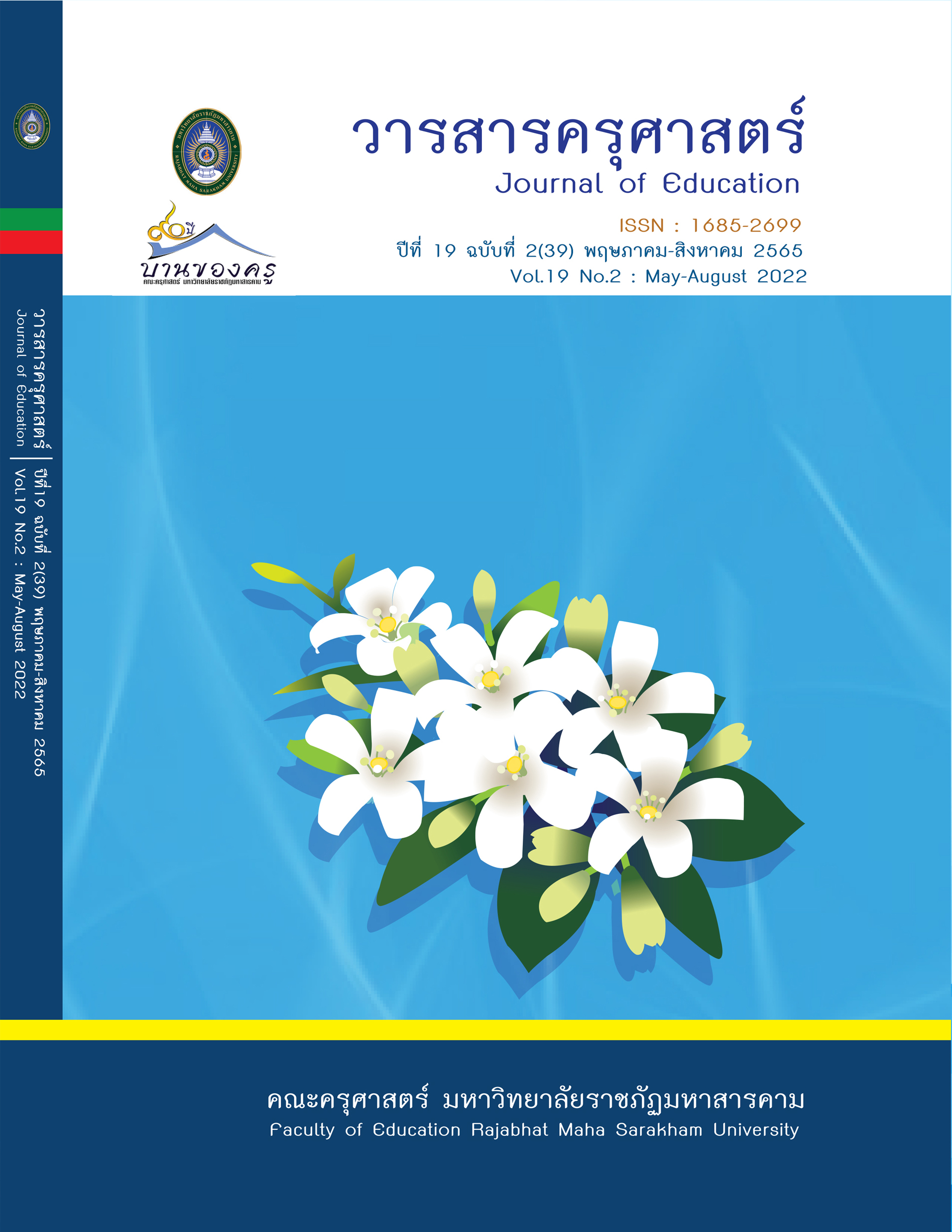The Study of the Effect of Unplugged Coding Leaning Activity on Computational Thinking Skill of Grade 3 Students.
Main Article Content
Abstract
The purposes of this study were 1) to study the effect of unplugged coding learning activity on computational thinking skill of Grade 3 Students with an efficiency of 70/70, 2) to compare computational thinking skill after participating in learning activity, and 3) to study the students’ satisfaction of the learning activity. The sample group of this research consisted of 43 students in Grade 3/7, Anubanmahasarakham School in the second semester of the 2021 academic year, the sampling used the Simple random method. The research instruments included 1) a lesson plan, which 12 sub-learning plans for 12 hours, 2) 20 items computational thinking skill multiple-choice test, and 3) 10 items of the satisfaction questionnaire. The statistics used for data analysis were percentage, standard deviation (S.D.), the formula E1/E2 (Efficiency) and The Wilcoxon Test.
The findings revealed that
- The efficiency of lesson plan with unplugged coding learning activity or coding learning activities without a computer was 75.69/72.91, reaching the established criteria of 70/70.
- Students who participated in the learning activity has a higher level of computational thinking skill, at .05 of a significantly statistic level.
- The satisfaction of students who participated in unplugged coding learning activity to enhance computational thinking skill was at the highest level.
Article Details

This work is licensed under a Creative Commons Attribution-NonCommercial-NoDerivatives 4.0 International License.
ข้อกำหนดเบื้องต้นที่ผู้นิพนธ์(ผู้ส่งบทความ) ควรทราบ
1. ผู้นิพนธ์ที่ประสงค์จะลงตีพิมพ์บทความกับวารสาร ตั้งแต่เดือนมกราคม 2563 เป็นต้นไป ให้ใช้รูปแบบใหม่ (Template 2563) โดยสามารถดูตัวอย่างได้ที่เมนู GUIDELINES
2. จะตีพิมพ์และเผยแพร่ได้ ต้องผ่านการประเมินจากผู้ทรงคุณวุฒิ (Peer Review)
3. การประเมินบทความโดยผู้ทรงคุณวุฒิ (Peer Review) เป็นแบบ Double Blind
4. การอ้างอิงบทความใช้หลักเกณฑ์ APA (American Psychological Association) คลิก
5. บทความถูกปฏิเสธการตีพิมพ์ ไม่ผ่านการประเมิน ผู้นิพนธ์ขอยกเลิกเองหรือชำระเงินก่อนได้รับการอนุมัติ ทางวารสารไม่มีนโยบายการคืนเงิน
References
กระทรวงศึกษาธิการ. (2560). รู้จักวิทยาการคำนวณ. ใน เขมวดี พงศานนท์ (บ.ก.), การจัดการเรียนการสอน Coding
และ Computer Science. การประชุมเชิงปฏิบัติการการเรียนรู้วิทยาการคำนวณและโค้ดดิ้ง. สำนักงานคณะกรรมการการศึกษาขั้นพื้นฐาน .
ชฎารัตน์ พิพัฒนนันท์. (2564, 27 กรกฎาคม). CS Unplugged เรียน Coding โดยไม่ใช้คอมพิวเตอร์. https://www.starfishlabz.com
ผนวกเดช สุวรรณทัต. (21,พฤศจิกายน,2560). Computational Thinking ในชั้นเรียนแห่งศตวรรษที่ 21. ใน (ศิริเดช สุชีวะ), การประชุมวิชาการวิทยาศาสตร์ คณิตศาสตร์ในโรงเรียน ระดับชาติ ครั้งที่ 23. จุฬาลงกรณ์มหาวิทยาลัย.
ประภัสสร สำลี. (2564). การพัฒนาชุดกิจกรรมการเรียนรู้แบบ Unplugged Coding เพื่อเสริมสร้างทักษะการคิดด้าน
วิทยาการคำนวณ สำหรับนักเรียนชั้นอนุบาลปีที่ 3. วารสารวิจัยและนวัตกรรมสถาบันอาชีวศึกษา
กรุงเทพมหานคร, 4(2), 181-198.
ปลูกปัญญา. (2563, 27 กรกฎาคม). UNPLUGGED CODING: โมเดลทักษะแห่งอนาคต สำหรับเด็กปฐมวัย.
โรงเรียนอนุบาลมหาสารคาม. (2563). รายงานผลการประเมินตนเองของสถานศึกษาโรงเรียนอนุบาลมหาสารคาม
ประจำปี 2563. ฝ่ายวิชาการ โรงเรียนอนุบาลมหาสารคาม.
ศิริรัตน์ หวังสะแล่ะฮ์. (2563). แนวทางการจัดการเรียนการสอนสาระวิทยาการคำนวณระดับมัธยมศึกษาตอนต้น.
วารสารสมาคมนักวิจัย, 26(1), 125-137.
สถาบันส่งเสริมการสอนวิทยาศาสตร์และเทคโนโลยี. (2562). คู่มือการใช้หลักสูตร เทคโนโลยี (วิทยาการคำนวณ)
กลุ่มสาระการเรียนรู้วิทยาศาสตร์ (ฉบับปรับปรุง พ.ศ. 2560) ระดับประถมศึกษาและมัธยมศึกษา (พิมพ์ครั้งที่ 1).
โรงพิมพ์คุรุสภาลาดพร้าว.
สุวิมล นิลพันธ์. (2564). การจัดกิจกรรมการเรียนรู้แบบ Unplugged เพื่อพัฒนาทักษะการคิดเชิงคำนวณ เรื่อง
รูปสี่เหลี่ยม ของนักเรียนชั้นประถมศึกษาปีที่ 5. วารสารบัณฑิตศึกษา มหาวิทยาลัยราชภัฏวไลยอลงกรณ์
ในพระบรมราชูปถัมภ์, 15(2), 208-223.
Bell, T. C., Witten, I. H. & Fellows, M. (2015). CS Unplugged: An enrichment and extension programme for
primary-aged students. University of Canterbury.
Kim, B., Kim, T. & Kim, J. (2013). Paper-and-pencil programming strategy toward computational thinking for
non-majors: Design your solution. Educational computing research, 49(4), 437-459.
Wing, J. M. (2006). Computational thinking. Communication of the ACM, 49(3), 33-35.
Tsarava, K., Moeller, K., Pinkwart, N., Butz, M., Trautwein, U. & Ninaus, M. (2017).Training Computational
Thinking: Game-Based Unplugged and Plugged-in Activities in Primary School. University of Tübingen.


